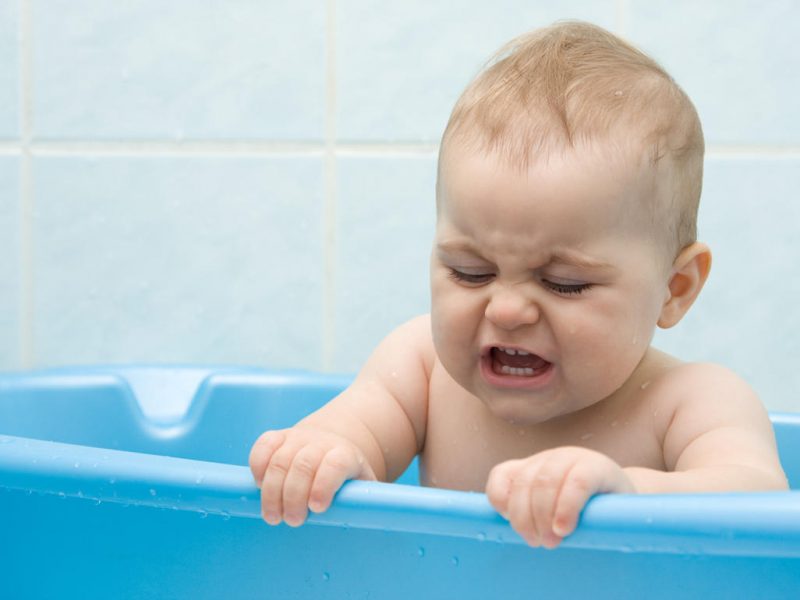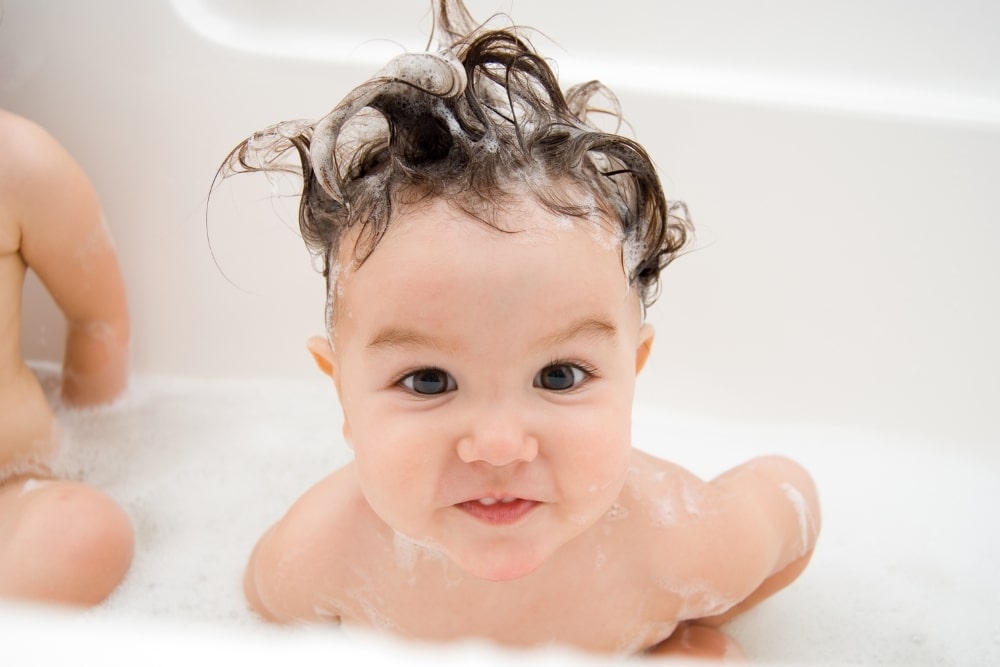There are babies that hate taking a bath, and then there are babies that scream at the top of their lungs after the bath. Either way, you need to figure out how to calm your baby.
First, you’ll need to determine why your baby is screaming. They’re usually cold or simply don’t like the bath for one reason or another. Then, you need to solve that underlying issue.
In this article
Does Your Baby Cry During The Bath Or After The Bath?
When your little one starts screaming, it can indicate what the problem is. If your baby starts to scream during the bath, this could be several things.
However, if your little one doesn’t make a whimper until after the bath, it can signal other things. The next time you give your baby a bath, determine which one it is to make sure that you find the underlying problem.
Reasons That Babies Cry During A Bath (And How To Calm Them)
Babies usually cry during a bath for one of the various reasons. They could be cold, or they may feel insecure.
These are the two most common reasons that babies don’t like baths, but there are a few not so common reasons to watch out for as well.
Water Is Making Your Baby Feel Insecure
A lot of babies don’t like to be in the water. This is because they don’t like the insecure feeling that floating gives them. Think about how different this feeling is from being held closely.
To determine if this is the problem, try giving your baby a bed bath, just like you did when they were a newborn baby. The safe feeling of being wrapped in a towel is enough to keep babies calm.
If you have some shampoo or soap that does not require rinsing you can also do this. Most babies outgrow this as they get older.
If a bed bath is simply not an option, consider wrapping them in a towel inside the bathtub. Then, take out parts of their body as you wash them, just like you would a bed bath.
However, this is a bit easier because you can pour water over them to rinse them off. Last, you can take a bath with your baby. While some parents frown upon this, some don’t.
If it makes you feel uncomfortable, consider wearing a bathing suit in the bathtub. You can make your baby feel secure in your arms while giving them a bath at the same time.
View in gallery
They Don’t Like The Temperature
Babies cry when they don’t like something, even if it’s not hurting them. Your little one might not like the bath temperature. Make sure to test it with your wrist to ensure that it’s not too hot or too cold.
Then, adjust it slightly to make it warmer. Babies might prefer warmer water than you realize! Just make sure it’s not hot enough to hurt your baby. Likewise, babies might prefer cooler water.
Unfortunately, there’s no easy way to tell whether this is the problem. Instead, you have to do it by trial and error. If this doesn’t seem to make a difference, the water temperature is not the problem.
They’re Cold
When babies are barely submerged in water, they can get cold. Even if the water is warm, babies might get chilly easier. Signs that your baby is cold include:
- Cold feet or hands
- Nose feels cold
- Hands and/or feet turning blue
- Fussiness
- Cold stomach or back when touched with the back of a hand
- Lower than normal temperature
- You can see their veins (this is caused by a condition called livedo reticulous)
If this is the case, try putting more bathwater into the bath so that more of your baby’s body is in the water. This can keep them warmer while in the bathtub.
When my daughter was younger, we lived in a house that did not have a heater vent in the bathroom, leaving it with a constant chill. We purchased a space heater for the bathroom.
Then, we turned it on to help the bathroom be warm and toasty before running her bathwater. This is another great option if your baby is cold!
The Shampoo Irritates Their Skin
Babies have sensitive skin, and baby shampoos do have a lot of ingredients in them! If your baby starts screaming shortly after you apply baby body wash or shampoo, try switching to a new brand.
Babies that get irritated by certain ingredients might not have a reaction that is severe enough to cause a rash, but this doesn’t mean that it doesn’t bother them.
If you’re not sure what’s going on at bath time, switching to a new shampoo or body wash is worth a shot.
What To Do When Your Baby Cries After Bath?
When your baby cries after a bath, it signals that it is something else. If your little one loves the bath but seems inconsolable when you take them out, it means that there’s a problem after they get out of the bath.
- Animal face plush hooded bath robe
- Made with 100% plush coral fleece fabric
- Soft and gentle on babys skin
- Optimal for everyday use
- Affordable, high quality bath robe
Prices pulled from the Amazon Product Advertising API on:
Product prices and availability are accurate as of the date/time indicated and are subject to change. Any price and availability information displayed on [relevant Amazon Site(s), as applicable] at the time of purchase will apply to the purchase of this product.
They Don’t Want To Get Out Of The Bath
When little ones don’t want to get out of the bathtub, they’re more likely to scream after you take them out. If your little one enjoys the bath, this is a likely culprit.
Bring one of their favorite toys with you into the bathroom. Then, when you take them out of the bath, immediately show them the toy. This will distract them from the fact that they had to get out of the bathtub.
They’re Cold
It’s common for babies to get cold after they get out of the bathtub. Think about how cold you get after a steaming hot shower! If your little one is cold, get them warm as soon as possible.
Some tips to help them warm up quickly are:
- Make sure the bathroom is extremely warm
- Throw their bathrobe or towel in the dryer. Then, have someone else bring it to you in the bathroom when bath time is over
- Cuddle them
- Wrap them tightly in a towel or bathrobe
- Do not unwrap them to dry them off. Instead, rub them dry via the towel or robe that they are wrapped in
- Get them dressed in warm clothing quickly
View in gallery
The Lotion Irritates Them
Just like baby wash and baby shampoo can irritate your little one, so can baby lotion. It can be especially irritating if it is scented and if your baby has dry skin.
Dry skin gets irritated easier than average skin. If you’re unsure, skip the lotion for a couple of days to see if it makes a difference.
Try Soothing Measures That Work When Your Little One Is Bothered
Anytime that your baby is uncomfortable, try soothing measures that work at other times. If you’re a new mom and still learning, try some of these:
- Rocking
- Singing
- Bouncing
- Combine rocking or bouncing with singing
- Music
- Patting their back
- Hold them close to your chest
Even if your baby seems inconsolable, and you’re still trying to figure out what is going on, soothing measures can still provide them with the comfort that they need to form a secure attachment.
In Conclusion
If your little one hates bath time, or after bath time, pay attention to when they are crying. This will be your biggest clue as to why they are screaming during or after bath time. Then, you can work on a solution to the problem.






